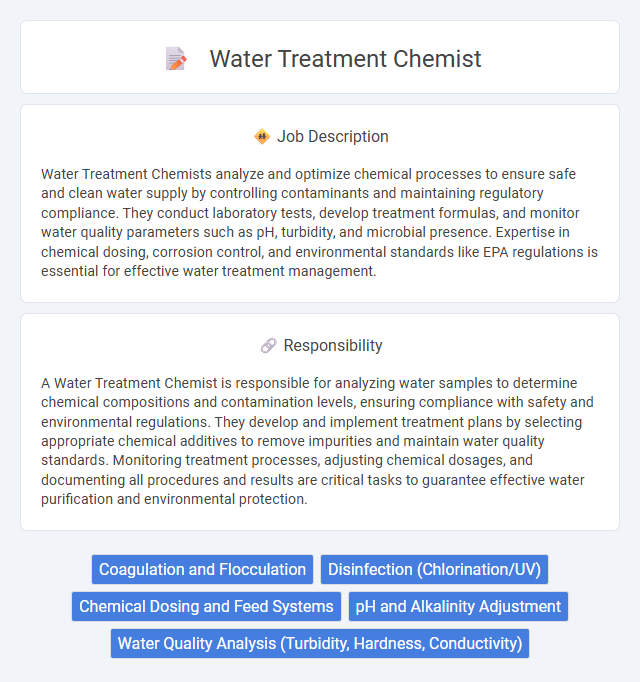
Water Treatment Chemists analyze and optimize chemical processes to ensure safe and clean water supply by controlling contaminants and maintaining regulatory compliance. They conduct laboratory tests, develop treatment formulas, and monitor water quality parameters such as pH, turbidity, and microbial presence. Expertise in chemical dosing, corrosion control, and environmental standards like EPA regulations is essential for effective water treatment management.
People with strong analytical skills and a keen interest in chemistry are likely suitable for a Water Treatment Chemist role, as the job often requires analyzing water samples and developing treatment solutions. Individuals comfortable with laboratory work and following strict safety protocols may find this position aligns well with their abilities. Those preferring dynamic, hands-on problem-solving environments might also be a good fit, as the role can involve troubleshooting contamination issues and optimizing chemical treatments.
Qualification
A Water Treatment Chemist typically requires a bachelor's degree in chemistry, environmental science, or chemical engineering to ensure a strong foundation in chemical analysis and water quality standards. Professional certifications such as Certified Water Technologist (CWT) or certifications from the American Water Works Association (AWWA) enhance expertise in water treatment processes and regulatory compliance. Practical experience in laboratory techniques, chemical dosing, and monitoring of water treatment systems is essential for accurate assessment and optimization of water quality.
Responsibility
A Water Treatment Chemist is responsible for analyzing water samples to determine chemical compositions and contamination levels, ensuring compliance with safety and environmental regulations. They develop and implement treatment plans by selecting appropriate chemical additives to remove impurities and maintain water quality standards. Monitoring treatment processes, adjusting chemical dosages, and documenting all procedures and results are critical tasks to guarantee effective water purification and environmental protection.
Benefit
Water treatment chemist roles likely offer benefits such as competitive salaries and opportunities for professional growth within environmental and industrial sectors. Employees may receive health insurance, retirement plans, and paid time off as part of their compensation packages. There is also potential for involvement in impactful projects that contribute to sustainability and public health.
Challenge
Water Treatment Chemist roles likely involve complex challenges in maintaining water quality and safety amid varying contamination levels. Frequent testing and chemical adjustments may demand precise analytical skills and adaptability to evolving environmental regulations. Balancing efficacy and environmental impact could prove to be a persistent challenge in this profession.
Career Advancement
Water Treatment Chemists play a critical role in ensuring safe and efficient water purification processes by analyzing chemical compositions and optimizing treatment methods. Career advancement opportunities include progressing to senior chemist roles, specializing in advanced water treatment technologies, or transitioning into environmental compliance and regulatory positions. Expertise in chemical analysis, regulatory standards, and innovative treatment solutions significantly enhances prospects for leadership and consultancy roles within the water industry.
Key Terms
Coagulation and Flocculation
Water treatment chemists specializing in coagulation and flocculation optimize chemical dosing to remove suspended solids, organic matter, and contaminants from water. They analyze water samples to determine appropriate coagulants like aluminum sulfate or ferric chloride, enhancing particle agglomeration and sedimentation efficiency. Their expertise ensures compliance with environmental standards and improves overall water clarity and safety for municipal or industrial applications.
Disinfection (Chlorination/UV)
Water Treatment Chemists specializing in disinfection are responsible for optimizing chlorination and UV processes to eliminate harmful pathogens and ensure safe potable water. They analyze water samples to determine appropriate chlorine dosages and UV exposure times, maintaining compliance with regulatory standards such as EPA and WHO guidelines. Expertise in chemical reactions and photolytic disinfection allows them to minimize by-products and enhance treatment efficiency for municipal and industrial water systems.
Chemical Dosing and Feed Systems
A Water Treatment Chemist specializes in optimizing chemical dosing and feed systems to ensure efficient water purification and compliance with regulatory standards. Expertise in selecting and calibrating pumps, controllers, and chemical feed equipment is critical for maintaining precise chemical delivery rates that prevent contamination and corrosion. Continuous monitoring and adjustment of dosing processes enhance water quality, minimize chemical waste, and extend equipment lifespan in industrial and municipal water treatment facilities.
pH and Alkalinity Adjustment
A Water Treatment Chemist specializes in monitoring and adjusting pH and alkalinity levels to ensure optimal water quality and safety. Precise control of pH prevents corrosion and scaling in industrial systems while maintaining regulatory compliance. Alkalinity adjustment stabilizes water chemistry, protecting infrastructure and improving the efficiency of treatment processes.
Water Quality Analysis (Turbidity, Hardness, Conductivity)
A Water Treatment Chemist specializes in analyzing water quality parameters such as turbidity, hardness, and conductivity to ensure safe and efficient water treatment processes. Accurate measurement of turbidity helps detect the presence of suspended particles, while hardness analysis determines calcium and magnesium concentrations affecting scaling potential. Monitoring conductivity provides critical data on the ionic content and overall purity of water, enabling optimization of treatment protocols for industrial and municipal applications.
 kuljobs.com
kuljobs.com